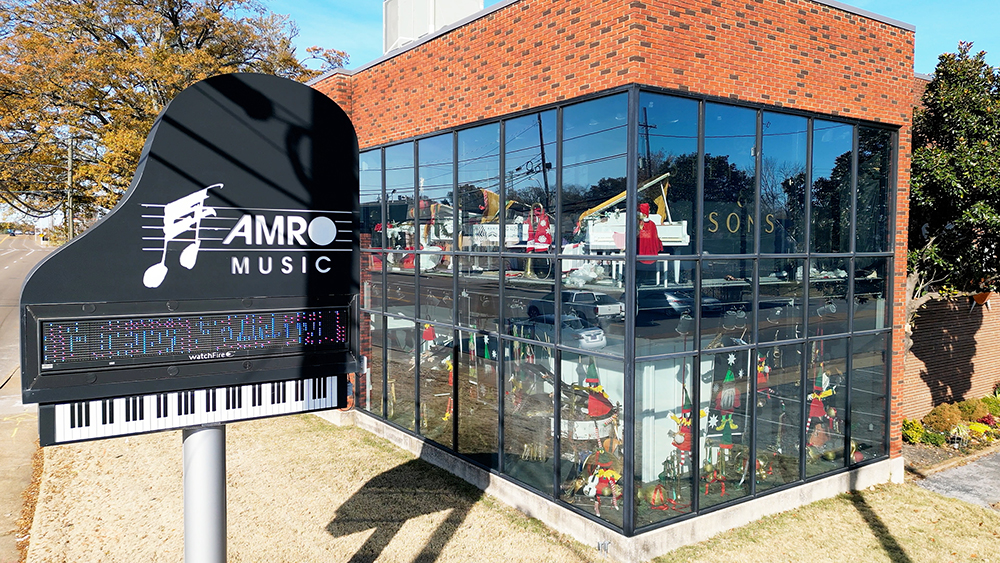For nearly 20 years, Amro Music has won the Flyer’s Best Music Equipment Store in Memphis. Regarding the long-standing honor, vice president and co-owner Nick Averwater says it’s as simple as customer and employee satisfaction: “This is our people telling us that we’re doing a good job.”
You’ve certainly driven by Amro. Located on Poplar Avenue next to the Benjamin L. Hooks Central Library, its iconic piano sign displays the weather or phrases like “Music Makes You Smarter.” “Most people know us as that music store with windows,” says Averwater. Inside is an abstract arrangement of stringed instruments and pianos. The historical Piano Gallery is housed in the lot next door. This dates back to Averwater’s great-grandfather, Sil Averwater, who founded Amro in 1921. “He was on his way to L.A., seeking fame and fortune, and made a stop in Memphis. Nobody was teaching piano, so he opened his windows and played for passersby. That was marketing back then.”
The century-old shop eventually grew to serve school orchestras in rural farm communities outside of Memphis. It continues that practice today, repairing and providing instruments for students in Kentucky, Arkansas, Tennessee, and Mississippi.
Walking into Amro, an array of shining saxophones, trumpets, and trombones rests above a fire-engine red keyboard. Dozens of stringed instruments hang on the north wall, with hundreds of music education books (for all skill levels) in accompaniment.
Music has been part of Averwater’s life since childhood, he says. “I’m a product of music education … and Memphis should have a music culture. It makes our schools and communities a better place.” As they reach their 104th year, their mission of nourishing students has remained unchanged. “School orchestras might not be the blues or clichéd Memphis music, but it’s a vibrant cornerstone.”
Averwater asks if I want a tour. I expect a walk around the floor and a couple of employee greetings. Instead, we walk through the repair shop upstairs. He shows me specific tools, cleaning methods, lighting fixtures, and mechanical approaches to repair. The brass section is flush with bright overhead lights. One mechanic, Jason, solders a brace back onto a trumpet. “Without the light, I wouldn’t be able to see this,” he says, pointing to a minute dent near the mouthpiece. He learned how to repair instruments at Amro, where he’s been working for the past three years. He got his first trumpet at Amro in fifth grade and went on to march in the University of Memphis band.
Nearby are the woodwind mechanics, who work in a much darker space. “They utilize the shadows to better analyze their instruments,” says Averwater. One technician feeds an illuminated fluffy tube through a saxophone while fluttering the valves. I’m not sure what he’s doing, but it looks very professional. Yet the extent of their work goes beyond examinations and soldering. “We’ve seen ’em run over by cars, dropped off buses. … There’s not much that would surprise us anymore,” says Averwater. “We’ve seen it all, and then some,” says Nico, another repair technician.
I also see a mountain of instrument cases. Averwater says it’s the line of instruments waiting to be repaired. There were two rooms full of French horns, tubas, trumpets, trombones, oboes, saxophones, and more. “Those instruments represent a kid who doesn’t have an instrument … and they need their instrument to learn.” The shop churns out nearly 300 instruments a week for students all across the Mid-South.
The tour ends with a framed, original copy of Sil Averwater’s first piano instructional book, titled Amro System of Popular Music. As fourth-generation co-owners, Averwater and his cousin, CJ Averwater, both consider family to be an incredible foundation behind Amro’s success.
To Averwater, it was never a question whether to join the family business. To contribute to such an integral part of Memphis’ youth is nothing but a privilege, he says. “We could sell something else, but we get to sell musical instruments.”
